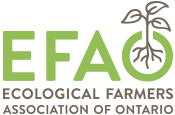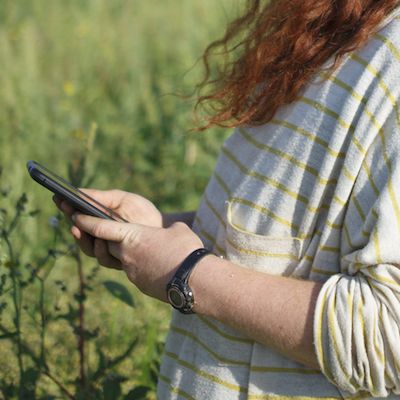Guest post contributed by EFAO partners, the Open Food Network.
A recent RBC report on the future of Canadian agriculture paints a picture of a future farm that resembles something out of Best Buy:
Farmer 4.0 will be working in office towers, data centres and engineering labs around the country, plugging into the people and machines that can turn our land and water into a hyper-efficient, and sustainable, food source for the planet (RBC, 2019, pg 8)
Farmers use (and have always used) lots of technology. In fact, farmers are the original ‘hackers’ – constantly tweaking or developing their own tools for their own unique needs. But what about digital tools, like online retail and distribution platforms, farm management software, and autonomous machines? According to this RBC report, farmers will need a software engineering degree to take part in this future of agriculture. However, at the Open Food Network-Canada (OFN-Can) we want to challenge this story.
Digital Tools: The good, the bad, and the ugly
Digital tools can do many things for farmers. First, field-level data acquired through mapping, sampling and sensor technologies provide site and time-specific data regarding crop health. This information can be used to tailor farm management strategies. Second, automated equipment can save farmers resources, such as time and energy. Finally, digital tools can manage inventory while assisting with marketing and distribution logistics. Online spaces connect farmers directly with new consumers and distribution hubs.
Many commentators on digital agricultural tools are expressing important reservations. Who owns these technologies and the data they generate? Some of these technologies are only accessible to already capital-intensive operations. At the same time, the benefits of data may be reaped by equipment manufacturers and software developers rather than the actual farmer from whose field it came. How will these technologies shape farm labour, community, and ecological practices? More broadly, how can we use digital technologies in a way that furthers ecological goals yet remains accessible for all shapes and size of farms?
Digital Tool Survey for Ecological Farmers
These are complex questions that the OFN-Can plans to explore. However, to do so we need your help! We want to understand digital technology trends and perceptions for EFAO members. What tools do you like? What tools do you need? What don’t you like about current tools? Why do you (or do you not) use digital tools? What do you see as the future of these tools for ecological farming practices in Ontario?
Funded by the OMAFRA New Directions Program and in partnership with the EFAO, OFN-Can is distributing a survey to explore these questions. If you are interested in participating and want a chance to win a 2020 EFAO Conference Pass, please fill out the survey through this link: https://tinyurl.com/AgTechSurv. Come find us at the EFAO Conference in December!
The Open Food Network (OFN) is an organization dedicated to leveling the playing field in agriculture. It levels the playing field by providing an open, non-proprietary, online marketplace for farms of all sizes: free to develop to meet your needs as a producer or consumer of food. OFN-Can is a regional chapter of the OFN.

